It's a Period. Not a Full Stop.
May 28, 2019
8710 Views
As the world celebrates Menstrual Hygiene Day, many of our daughters, sisters, and mothers still wake up to the taboos associated with the word – Period. Little girls are forced to give up their favorite sports or even education at menarche. Women hesitate to talk about problems down there, even with their own mothers. Health issues and pregnancies continue to derail promising careers for many girls. At Mapmygenome, we believe that a woman alone has the power to make a choice about her health and freedom, especially her menstrual health. Our team members and experts share their views and important health tips.
Let us destigmatize menstrual hygiene
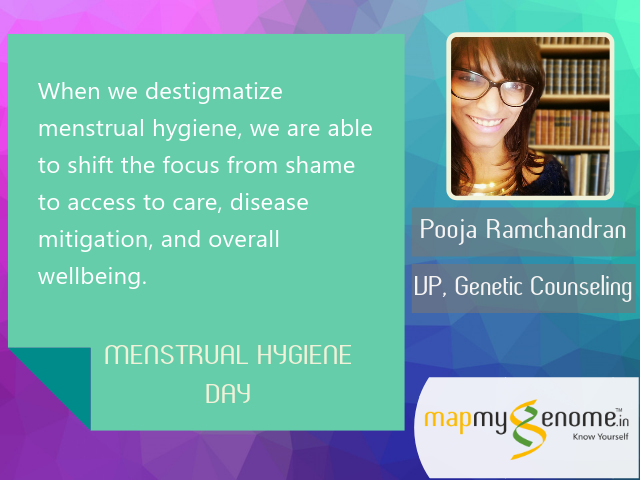
When we destigmatize menstrual hygiene, we are able to shift the focus from shame to access to care, disease mitigation, and overall wellbeing.
The right to correct care
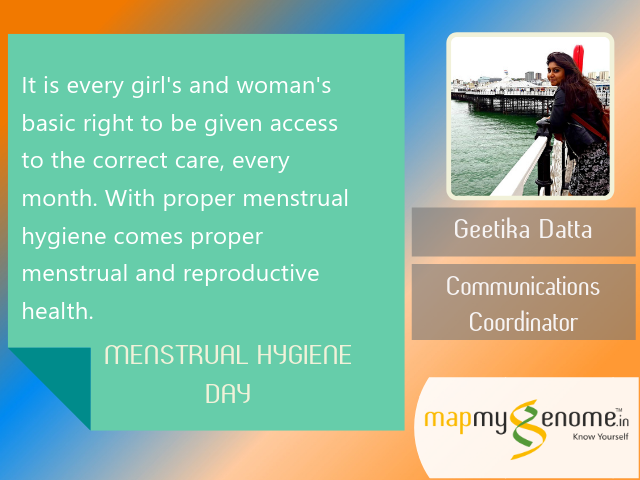
We live in a country where menstrual hygiene is taken anything but seriously, for two reasons; taboo and lack of accessibility. However, we also live in a world where menstrual care isn’t a distant notion anymore, but an attainable reality. It is every girl’s and woman’s basic right to be given access to the correct care, every month. With proper menstrual hygiene comes proper menstrual and reproductive health; a fact the world needs to be made aware of. So, this Menstrual Hygiene Day, let’s pledge to bring about awareness in the corners of the world that need it the most, so that every girl and woman can focus on what’s important, even on their period.
Live healthy, everyday
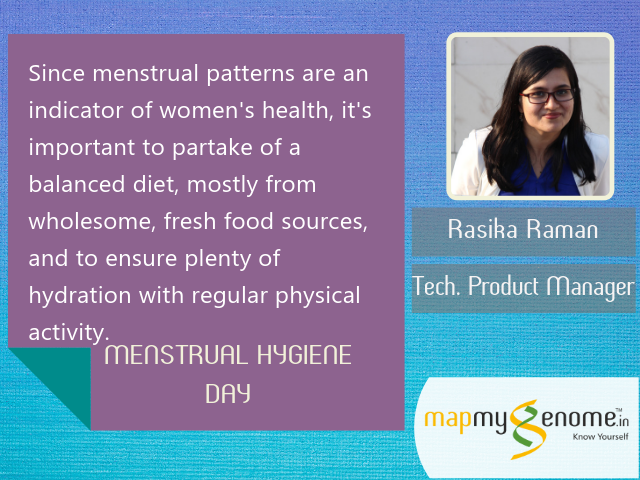
Since menstrual patterns are an indicator of women’s health, it’s important to partake of a balanced diet, mostly from wholesome, fresh food sources and to ensure plenty of hydration with regular physical activity.
Regular exercise greatly helps keep hormones in sync and manage PMS, especially pain caused by abdominal cramping. Some studies also reported that psychological symptoms of PMS are significantly lessened in female subjects who participate in regular, moderate-level physical activity. You can choose to stick to the activity you are most comfortable with, even whilst on your period. Rest in the classic child’s pose (yoga pose) or the cat-cow, to relieve tension in your back and hip muscles. Strength training (weights, Pilates) is a great option, too (some hormones actually increase your stamina), as long as you do not exert yourself too much. Aerobic activity such as walking, not only keeps your heart healthy but boosts your mood. Bye-bye, PMS!
Menstrual health and related characteristics can be influenced by genetics and family history. Endocrine disorders such as endometriosis, hyperthyroidism, PCOS, insulin resistance, dysmennorhea, etc., have been associated with genes that perform key roles in the body – hormonal signalling and synthesis, pubertal timing, ovarian function, etc.
Menstruation is not a punishment
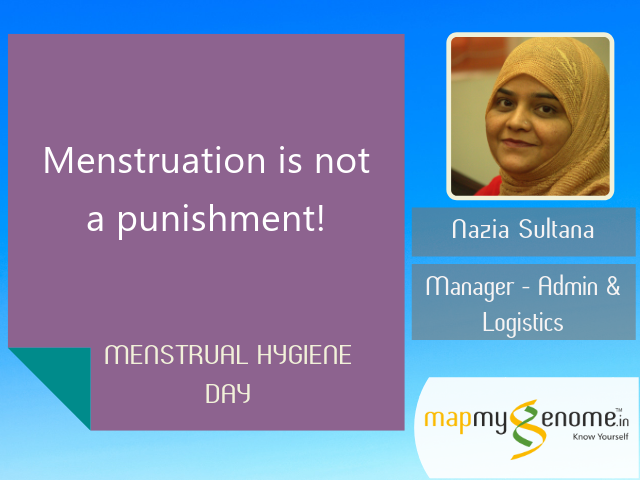
Even during the current month of Ramadan, while women are refrained from fasting & praying during their monthly cycle. They can always involve themselves in zikr, listening & reading Qur’an (without touching the Holy Book). It is quite common for a woman to feel missed out from the acts of worship, especially during this period and in this month, but it’s important for her to know that she is carrying out the instructions of her Lord by refraining from them and this in itself is pure obedience to Him.
Housekeeping for our body, mind, and spirit: Especially during menses
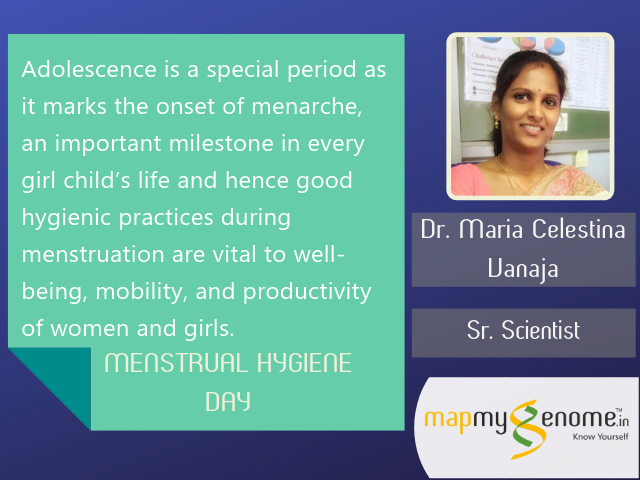
28 May is the menstrual hygiene day as May is the fifth month of the year, and women’s menstruation period lasts an average of five days, 28th as the average menstrual cycle is 28 days.
Adolescence is a special period as it marks the onset of menarche, an important milestone in every girl child’s life and hence good hygienic practices during menstruation are vital to well-being, mobility, and productivity of women and girls.
Some basic hygiene measures every female should take during menstruation:
- Take a shower at least once a day.
- Change pads/tampons/ menstrual cup regularly to prevent infections
- Use clean underwear.
- Do not use soaps or vaginal hygiene products to wash the genital area. Instead, clean the vaginal area using warm water regularly, after each use of toilet and even after urination. Washing the vagina with an intimate wash can affect the healthy balance of bacteria and pH levels in the vagina and cause irritation, making way for infections.
- Wash your hands with warm water and soap after changing your pad/tampon/menstrual cup.
- Wear comfortable, loose clothing during periods. This will ensure air flow around the sensitive areas as well as prevent sweating to a large extent.
It is important to understand Reproductive Genetics
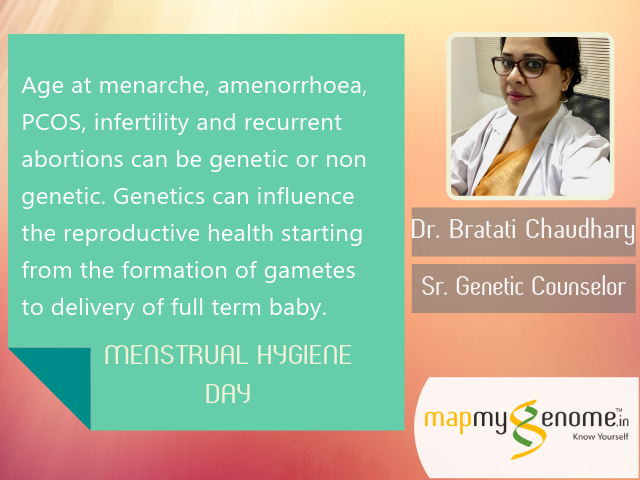
Age at menarche, amenorrhoea, PCOS, infertility, and recurrent abortions can be genetic or non-genetic. Some of the genetic associations are discussed here.
Female reproductive development:
Amenorrhoea is the absence of a menstrual period in a woman of reproductive age. Physiological states of amenorrhoea are seen most commonly during pregnancy and lactation (breastfeeding). It can be primary amenorrhoea (menstruation cycles never starting) or secondary amenorrhoea (menstruation cycles ceasing). Oligomenorrhea is defined as menses occurring at intervals longer than 35 days apart. The condition can be due to a chromosomal abnormality (e.g., Turner syndrome) or due to gene mutation (ANOS1, FGFR1, FSHR, SOX3, etc.).
Polycystic ovary syndrome (PCOS) is a syndrome involving defects in primary cellular control mechanisms that result in the expression of chronic anovulation and hyperandrogenism. There are few genes reported to be associated with PCOS. Some of the genes are FSHB, SHBG, FST, etc.
Infertility and recurrent pregnancy losses:
Genetics can influence the reproductive health starting from the formation of gametes to delivery of full-term baby. There are genetic factors that regulate implantation and embryonic development. Infertility and recurrent pregnancy losses can be due to chromosomal rearrangements like balanced translocations, inversions, deletions, etc. There are multiple gene mutations reported to be associated with female infertility (NOBOX, FMR1, TUBB8, FIGLA, etc.) and recurrent pregnancy losses (ANXA5, IGF2, MTHFR, etc.).
Genetic counseling followed by evaluation for the above-mentioned conditions can rule out any genetic association. This can be helpful for better management and treatment.
As mothers, sisters, and daughters, let us spread awareness about menstrual health and make the world a healthier and happier place for all women.

